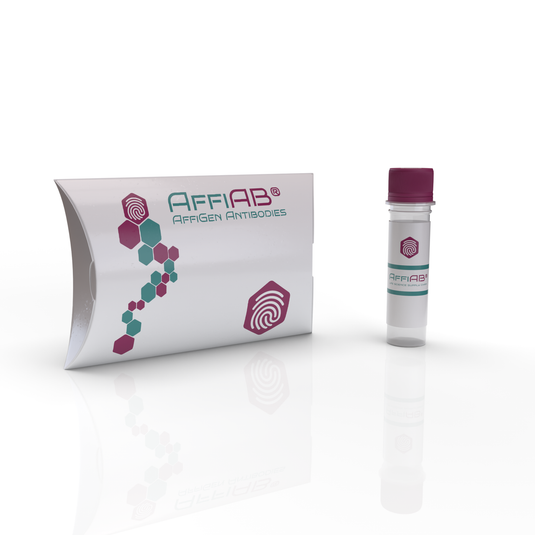AffiAB® Goat anti-GST Polyclonal IgG Antibody
AffiAB® Goat anti-GST Polyclonal IgG Antibody is a reliable tool for protein research. The antibody binds to proteins with GST tags, allowing for easier detection and analysis. This ensures accurate results and reduced overall experiment time.
Host: Goat
Species: N/A
Description: AffiAB® Goat anti-GST Polyclonal IgG Antibody is a polyclonal antibody produced in goats and designed for the detection and quantification of glutathione S-transferase (GST) proteins. GSTs are a family of enzymes that catalyze the conjugation of reduced glutathione (GSH) to a variety of endogenous and xenobiotic electrophilic compounds. These enzymes play a crucial role in the detoxification and elimination of toxic compounds in the body, making them important targets for drug development and toxicity studies. The AffiAB® Goat anti-GST Polyclonal IgG Antibody can be used in various applications such as western blotting, ELISA, immunoprecipitation, and immunohistochemistry. It recognizes both recombinant and native GST proteins, making it a versatile tool for GST detection in various sample types.
Gene Identifier/Accession Number: N/A
Form: N/A
Concentration: 2.5 mg/mL
Type: Primary
Clonality: Polyclonal
Isotype: IgG
Conjugation: Unconjugated
Application: Western Blot
Storage: For continuous use, store at 2-8 C for one-two days. For extended storage, store in -20 C freezer. Working dilution samples should be discarded if not used within 12 hours.
AffiAB® Goat anti-GST Polyclonal IgG Antibody is a reliable tool for protein research. The antibody binds to proteins with GST tags, allowing for easier detection and analysis. This ensures accurate results and reduced overall experiment time.
The antibody solution should be gently mixed before use.
Goat anti-GST Polyclonal IgG Antibody
The use of fusion proteins in molecular biology has been a cornerstone for studying protein interactions, expression, and purification. Glutathione S-transferase (GST) is a commonly used tag in these fusion proteins. The development of the Goat Anti-GST Polyclonal IgG Antibody has been a significant advance in the study and manipulation of GST-tagged proteins. This article explores the characteristics, applications, and importance of this antibody in biochemical and molecular research.
Background:
GST is an enzyme that plays a role in detoxification in cells and is often used as a tag in recombinant protein production due to its solubility and the ease of purification using glutathione agarose beads. The Goat Anti-GST Polyclonal IgG Antibody recognizes these GST-tagged proteins, facilitating a range of applications from Western blotting to immunoprecipitation.
Properties of Goat Anti-GST Polyclonal IgG Antibody:
Source and Production: This antibody is generated in goats, which are immunized with GST protein. Goats are preferred for their ability to produce high volumes of antibodies with high affinity.
Specificity and Sensitivity: As a polyclonal antibody, it targets multiple epitopes on the GST protein. This multi-epitope approach enhances the antibody's sensitivity and ability to detect GST-tagged proteins under various experimental conditions.
Purity and Quality Control: The antibody is typically purified using affinity chromatography, ensuring high specificity and minimal cross-reactivity. Quality controls, including ELISA and Western blotting, are performed to validate its specificity.
Applications in Research:
Protein Purification: The antibody can be used to immunoprecipitate GST-tagged proteins from cell lysates, aiding in the purification process, especially when glutathione beads are less effective.
Western Blotting: In Western blot applications, the Goat Anti-GST Polyclonal IgG Antibody is invaluable for detecting and analyzing the expression levels of GST-tagged proteins in cells or tissue samples.
Immunofluorescence and Immunohistochemistry: For localization studies, this antibody can be used to visualize GST-tagged proteins within cells or tissue sections, providing insights into protein distribution and function.
Challenges and Considerations:
When using polyclonal antibodies like the Goat Anti-GST IgG, researchers must be aware of potential batch variability and the possibility of cross-reactivity. Proper controls are essential for accurate interpretation of results. Additionally, ethical considerations regarding the use of goats for antibody production should be taken into account, adhering to ethical guidelines and welfare standards.
Conclusion:
The Goat Anti-GST Polyclonal IgG Antibody is a versatile and essential tool in the field of protein research. Its ability to specifically bind GST-tagged proteins has greatly facilitated the study of protein expression, interaction, and function. As the field of proteomics continues to expand, the use of such specialized antibodies will remain a critical component in the advancement of scientific understanding and innovation.

